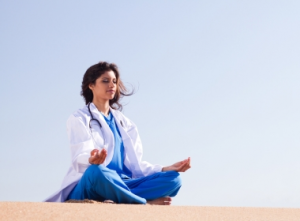The process of becoming a physician is an amazing and complicated journey. One part of this journey that gets little attention is how we teach (or don’t teach) our doctors-in-training to care for their own health.
 We certainly ask them to retain huge amounts of information, and we stress the importance of being deeply dedicated to their patients and work—but sometimes we overlook their own wellness. A 2008 study in Academic Psychiatry cited figures showing that as a group, physicians have higher rates of depression and suicide than the general population.
We certainly ask them to retain huge amounts of information, and we stress the importance of being deeply dedicated to their patients and work—but sometimes we overlook their own wellness. A 2008 study in Academic Psychiatry cited figures showing that as a group, physicians have higher rates of depression and suicide than the general population.
One reason for these unsettling facts is that as educators we sometimes miss an opportunity to help young doctors develop skills to find balance, meaning and well-being in their own lives even while they deal with the demands of the profession.
The Einstein Wellness Program is a determined effort to take advantage of this learning opportunity. At an orientation this month for new first-year medical students, we served a healthy lunch (they actually ate the tofu and the tempeh!) and offered the experiences of fellow students who gave advice on staying balanced through the first year and beyond.
Lindsay Fuller, a third-year student on her pediatrics rotation, talked about working in the community garden she helped start, and finding time once a week to visit Manhattan and enjoy the city. Manny Fishman, a rising second year, shared how biking and daily meditation keep him grounded.
For every student, there’s a different strategy. One exercise we conducted could easily be adopted by any medical student, doctor or professional under high stress. We had the members of the new class reflect on one activity they love—music, exercise, gardening, yoga—and resolve to keep that activity going during the pressures of their studies.
We then had them think about one person they love—a friend, a family member—and resolve to keep in close contact with that person during the year, because preventing social isolation is a major factor in wellness. The room fell silent and the mood turned serious as the students considered these two resolutions—perhaps wondering how difficult it might be to keep those commitments as they move into this unknown terrain.
Through the course of the year, we’ll offer students tools to help with this process of finding balance: free classes in meditation, Reiki and yoga, and the chance to learn how to do shiatsu massage. The Healer’s Art course in January will give them time to sit with faculty mentors and explore the meaning of medicine and its spiritual dimensions.
This is a relatively new idea—that it is good practice for physicians to learn how to take care of themselves. The model in the past has been selfless dedication and toughness, even to the point of an inability to acknowledge one’s own needs. The truth is, it is perfectly possible to dedicate ourselves fully to our patients and our profession without sacrificing our own well-being and balance. We aim to teach our students this on their way to becoming physicians.

